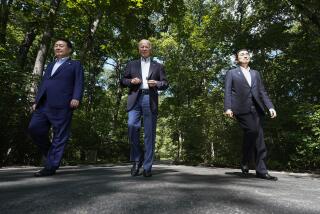Greater Japanese Defense Effort Urged : Carlucci Seeks Economic Assistance to Bolster Western Security
- Share via
TOKYO — Warning of a continued Soviet military threat in Asia, Secretary of Defense Frank C. Carlucci called on Japan on Monday to contribute to Western security with economic aid, financial support for U.S. troops and a steady buildup of its own defense capabilities.
Carlucci, who began a five-day visit to Japan last Thursday after taking part in the U.S.-Soviet summit conference in Moscow, said that America’s costly security commitments are increasingly under attack at home and that Japan can help defuse such criticism by spending more for the Western alliance.
“Japan does more than it often gets credit for,” Carlucci told a news conference, but “still more remains to be done.”
Although Carlucci’s remarks largely echoed the drumbeat of encouragement the United States has given to Japanese defense spending in recent years, his meetings with top Japanese officials came at a time when the country is struggling with the question of how to fulfill its role as a global economic power. Japan recently announced, for example, that it would provide non-military technical experts to U.N. peacekeeping forces.
The idea that economic aid bolsters the interests of the anti-Communist Bloc by contributing to stability in developing nations is one that Japanese officials are embracing. Japan now ranks second, behind the United States, in disbursement of official development aid and could rise to the top with the $5.5 billion it has budgeted for the coming fiscal year.
Carlucci cited the Philippines as an ideal target for Japanese economic assistance, which he said would help the government fight a Communist insurgency threatening the “fledgling democracy” of the post-Marcos era.
“Ensuring that the Philippines succeeds is in Japan’s interest as well as ours--and increased economic assistance could make the difference,” Carlucci said.
Japan could also spend more to support U.S. military personnel stationed in Japan under the U.S.-Japan security treaty, which costs U.S. taxpayers more than $3 billion a year, Carlucci said.
Japan already pays more than any other host nation--approximately $45,000 a year for each American--but greater efforts would “go a long way toward depriving American critics of one piece of evidence they now cite to show the high costs of maintaining our alliances,” Carlucci said.
He said Japan should continue to expand its military power beyond the “minimum capability” needed to defend the home islands and sea lanes. But U.S. officials do not desire a qualitative change from defensive to offensive capabilities, he said.
“We’re not looking for a dramatic leap in what Japan is doing in the defense area,” he said. “What we are saying is that within the defensive mission, Japan has a way to go to meet its goals.”
U.S. officials made progress in easing tension with the Soviets during the Moscow summit, Carlucci said, but he maintained that Soviet military power remains a menace in East Asia. The Soviet navy plies the Sea of Japan from the nearby port of Vladivostok, for instance.
Carlucci leaves today for Seoul, where security for the Summer Olympic Games is expected to be high on the agenda in meetings with South Korean officials.
More to Read
Sign up for Essential California
The most important California stories and recommendations in your inbox every morning.
You may occasionally receive promotional content from the Los Angeles Times.










